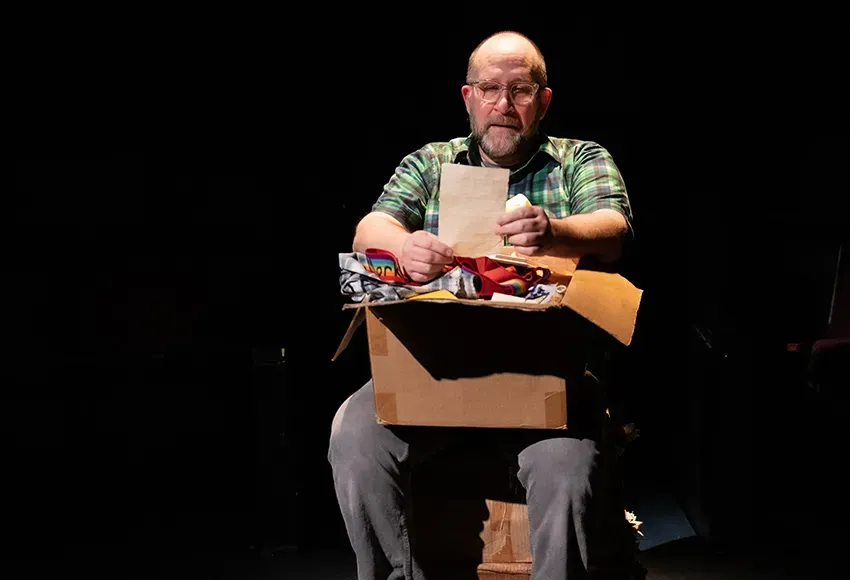For anyone who enjoys interactive theater and can sit through a one-person show without groaning, Every Brilliant Thing might be the program for you! However, theatergoers should know that the play explores triggering topics, including suicide. Anyone with a sensitive history with this topic may want to sit this one out.
All the feels
Despite being branded as a comedy, Every Brilliant Thing tries very hard to evoke heartbreak from the audience. In the very first scene, actor Ian Bell requests audience participation in a reenactment of the euthanasia of his childhood dog. As far as the story goes, it's an easy (and sometimes cheap) way to tug on the heartstrings of audience members who have likely experienced the same thing.
Right off the bat, the crowd feels immediate empathy for our storyteller, who uses youthlike whimsy to compare his first experience with death to his mother's first suicide attempt. While the audience may know this is where the story is going, as soon as suicide is mentioned, the tone in the room shifts. It is a topic that needs to be addressed with tact and precision.
The first half of the play provides a heartbreaking and fresh perspective on suicide, as the room gets to peer into the eyes of a young child learning about death and depression at just seven years old. The boy's list of "brilliant things" that make life worth living is enduring and a testament to his love for their mother.
Missing the point
The show sets itself up to go in many directions, both as a semi-improvised piece and in terms of a structured plot. With the established premise of a child's optimism contrasted with a mother's battle with depression, the play could dive into the complexities of the disorder, and it could get into the deep love and humanity of the struggling mother. Instead, however, it chooses to narrow its focus on the boy as he grows up.
The storyteller adopts a different tone, indicating growth, as he details his mother's second attempt ten years later. This time, he has less empathy for his mother. Through his monologue, the crowd can understand the anguish and struggle of a child whose parent cannot properly care for them.
The story crafts a feeling of intimate empathy and pity for the child of a mentally ill woman, but it leaves little humanity for the mother. Audience members are recruited to act out pivotal characters in the story, from a childhood therapist to a college professor, and from a love interest to even the storyteller's father. However, the mother is never given a voice.
When suicide ultimately does take her life, the audience is left upset with her. There is an aura of blame and guilt. If only this woman had tried to get over her depression, if only she had absorbed the list of brilliant things, maybe she wouldn't have taken her own life.
The reality of depression and suicide is that it is not a choice. Nice things, like the color yellow, ice cream, and Michael Keaton's voice, aren't enough to keep suicidal people alive. Medicine, therapy, and intervention are often necessary.
The monologue only continues to twist the blade of guilt further when the storyteller angrily spews off facts about how suicide is "contagious." Ironically, he exclaims that there are correct ways to talk about suicide in the media. Perhaps the worst part of this monologue is when he informs the crowd that attempting suicide can often inspire others to do it too, implying selfishness to the action.
Landing on the tip of the iceberg
The show attempts to recover from the heavy d.a.r.e-like anti-suicide sermon by showing that the storyteller ultimately suffers a mental breakdown. He has one conversation with a therapist, something his mother was never strong enough to do, and continues to find beauty in the everyday. Perhaps the fact that he could still see beauty in everyday life should be enough of an indicator that he was not experiencing depression to the same extent that many people do.
Despite the play's lackluster attempt to tackle such a heavy beast, there were plans for a post-performance debriefing on March 28 for anyone with the energy to stick around.
"We will discuss how the artist's choice to present their story in this way, as a one-man show with improvised audience involvement, draws the audience into this exploration of mental health and highlights the intersections between theater and therapy," said Artistic Associate Shana Bestock. "This discussion will allow us to reflect on shared experiences, build empathy, and gain a deeper understanding of how brilliant things connect us, move us forward, and empower us, through the community."

Praise for Ian Bell
While the story itself may not be the most empathetic approach to the subject, it is not for lack of effort by ACT. Bell puts his whole heart into the performance and brings a contagious energy. He approaches audience members with kindness and can coax performances out of the shyest in the room.
The writers have also updated the script and made it feel more personal to Seattleites. "It's the show that Seattle needs right now," said producer Paige Lee. "It touches on so many different subjects, and there are a lot of really great changes they made to the script to localize [it]. People who come see [it] who have lived in Seattle will resonate with the character so much."
The improvisation also means that each night will vary in regards to what happens on stage. The crowd is there just as much to create the experience as they are to live it.
"What I love about this show is that it's not going to mean the same thing to people...from one night to the next. It's just that beautiful journey of life and love, sorrow and joy," said producer Anita Shaw. "I love watching the audience have this experience. The lights are up in the house, and you can see the audience have this experience. It's so great when the building is open and alive with people."
If you're looking for a show that will make you laugh and cry, and you're willing to shout out a random prewritten phrase, Every Brilliant Thing is the production for you.
Just keep in mind that mental illness is not a choice. It's a real battle people are fighting. Those who lose that battle are not weak-willed or selfish. The conversation around depression and suicide needs to continue to happen, and Every Brilliant Thing is starting the dialogue.


